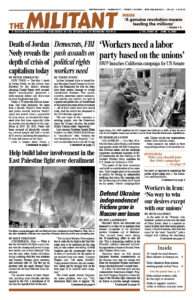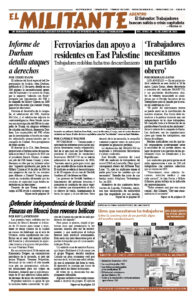Moscow’s forces are exhausted and hemmed in as they try to maintain their tenuous occupation of the destroyed eastern Ukrainian city of Bakhmut. They incurred heavy losses during the 10-month-long effort to take the city. This is sharpening conflicts in the Kremlin’s military command and fueling opposition at home to Russian President Vladimir Putin’s war.
Ukrainian forces on hills around Bakhmut threaten counterattacks on the Russian units that are taking over from the decimated Wagner mercenary troops that led Moscow’s assault there.
In a May 24 interview with pro-war commentator Konstantin Dolgov, Wagner chief Yevgeny Prigozhin vented his rage at the Russian high command for its failure to provide enough ammunition for his troops in Bakhmut. He admitted his private army of 85,000 had lost tens of thousands of fighters.
Prigozhin also complained the invasion had turned “Ukraine’s army into one of the most powerful in the world.”
To win the war, he demanded the Russian government enact martial law, which would give unlimited authority to military commanders; launch another wave of conscription; and institute forced labor to raise armaments production. The course he advances would be even more disastrous for working people than that carried out by Putin.
Moscow fired interviewer Dolgov and then blocked Prigozhin’s access to state media.
A Russian soldier named Ruslan, who arrived in Bakhmut May 8, was put under the command of a Wagner fighter who told him and others, “If you refuse to fight, I will annihilate you.”
The next day Ruslan decided to surrender. He saw a small Ukrainian drone hovering above him. He signaled to the camera of the drone operator, and the device led him across no man’s land to Ukrainian lines.
The video of his desertion was widely reported. The Ukrainian “I Want to Live” hotline, for Russian soldiers wishing to surrender, was contacted 3,174 times in April, 10% more than the previous month.
Some Russian soldiers are beginning to desert in groups. The Ukrainian army says that about 20 conscripts from Moscow’s army deserted from Svatove in a truck May 25.
Prigozhin threatens ‘revolution’
Putin justifies his bloody invasion with false claims that before the Soviet Union was formed “there was never any Ukraine.” He blames Bolshevik leader V.I. Lenin for its creation. In reality, the fight of the Ukrainian toilers for independence against the Russian czars began centuries before.
Prigozhin said the impact of the war would deepen class polarization inside Russia that “could end as in 1917 with a revolution.”
His comparison misses some decisive facts. In 1917 working people forged a communist leadership, steeled in battle and capable of leading millions to take power in the course of an immense revolt that swept the Russian Empire during the carnage of the First World War.
The workers and peasants government that came to power in October 1917 was led by the Bolshevik Party. It defended the right to self-determination of oppressed nations, like Ukraine. The Soviet Union under Lenin’s lead was founded as a voluntary federation of autonomous republics.
Nothing like that exists today. The only organized opposition to Putin is from the right, standing for even greater violence against Ukraine, including nuclear attack.
Last year alone, the Putin regime arrested over 20,000 people. Some 176 organizations and individuals were listed as “foreign agents,” opening them up to criminal investigation. Still there are many examples of anti-war actions while Putin’s response is devastating Russian culture.
At the end of May, Olga Tsukanova and the Council of Soldiers’ Mothers and Wives that she leads were added to Putin’s list of “foreign agents.” The group held protests last fall demanding proper training and medical care for their conscripted relatives, and for peace talks to begin.
On both sides of the war, mothers of prisoners of war are helping each other locate and help captured soldiers. “We work under the understanding that all soldiers are someone’s children, so there is never any animosity between us,” Alla Makruch, who leads the initiative from the Ukrainian side, told conflictfieldnotes.com. Following her group’s proposal, the Ukrainian government now permits Russian mothers to visit their loved ones in Ukrainian prisons. So far, none have made the trip.
Makruch’s counterpart, Valentina Melnikova, is the director of the Union of Soldiers Mothers in Russia. She is pressing Moscow to allow the International Red Cross to inspect conditions in Russian prisons where Ukrainians are held.
The Putin regime fears that fraternization like this could lead to weakening support for a war that has never been widely popular.

